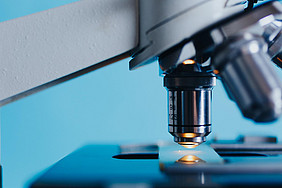The biotech boom in Germany continues - but at a slightly lower level. According to the latest "German Biotechnology Report 2022" by auditing and consulting agency Ernst & Young (EY), companies raised 2.4 billion euros last year - the second-best annual result ever. Compared to 2019, funding thus increased by 170 percent. The overall flight of fancy continues, albeit at a slightly slower pace. Bavaria's biotech sector, especially Munich-based companies and startups, are playing a significant role in this development.
From the perspective of the biotech industry in Germany, one is already in the post COVID-19 era, according to EY’s “German Biotechnology Report 2022”. This is confirmed by the key figures on financing. A broad spectrum of indications, larger financing rounds overall and a trend towards more partnership models are the special features of this period.
Capital raised of 2.4 billion euros - second-highest volume ever
In the fight against Corona, the German biotech industry showed its potential. But even without the exceptional funding for vaccine development against COVID19, the companies continue to develop and show that they are among Germany's innovation drivers. After 2020, which was the record year for raising capital at around 3.1 billion euros, the companies raised 2.4 billion euros last year - the second-best annual result ever. Compared to 2019, funding increased by 170 percent.
Highest IPO capital raising and broader venture capital funding
2021 witnessed the highest IPO capital raising ever, with two initial and two secondary listings each on NASDAQ: four IPOs raised nearly 700 million euros, a 52 percent increase over the previous year. Evotec, based in Hamburg and Martinsried, leads the IPOs with 427 million euros raised.
In the recent past, the total volume of venture capital financing was primarily characterized by large-volume exceptional financing (2020: CureVac, 2019 and 2018: BioNTech). In 2021, the innovative strength of the German biotech industry was reflected in significant rounds of financing and registered a more even distribution of the capital raised across different companies in a wide range of therapeutic areas. Planegg-based cancer therapeutics developer iOmx Therapeutics received 65 million euros in second-round funding from lead investors Athos and MIG Capital. Further Series B financing was received by Berlin-based T-knife (93 million euros) and Hanover-based Cardior Pharmaceuticals (64 million euros). The five largest financing rounds were completed by atai Life Sciences from Berlin (164 million euros) and Emergence Therapeutics from Duisburg with 87 million euros. Overall, venture capital funding was lower than in the previous year at -15%, but still significant.
Munich-based biotech company among increased number of German buyers
As in previous years, the value drivers in the alliances of the German biotechs were innovative technology platforms. As in the year before, there was also a mega-deal in the area of mergers and acquisitions: MorphoSys AG from Martinsried/Planegg acquired the U.S. company Constellation Pharmaceuticals for 1.41 billion euros. Other German buyers included BioNTech, Sartorius, Eckert & Ziegler and Brain Biotech. Martinsried-based SIRION Biotech, a producer of viral vectors founded in 2005, was acquired by PerkinElmer for 153 million euros for its expansion in viral vector technology for cell and gene therapy. Four other deals, out of a total of 21, exceeded the 100-million-euro mark, bringing the total volume to 2.06 billion euros - the highest value since the biotech industry was founded.
Munich is a hub for start-ups
For 2021, 30 German biotech start-ups were identified, compared with only 19 in the same period in 2020. As in the previous year, there was a clear dominance of 53 % of new start-ups among therapeutics developers, followed by companies from the service (20 %) and diagnostics (13 %) sectors. The regional distribution of start-ups showed a west-east as well as a south-north gradient, with Bavaria dominating the south with ten new companies (33 %). With the six start-ups Deoxy, Eximmium Biotechnologies, Neurevo, QOACompany/NxFoods, rnatics und Smartbax, the major growth was in Munich (including Martinsried). This corresponds to a share of over 20% of all start-ups.
Biotechnology can also be used in the bioeconomy
In the light of ambitious climate targets and with a view to environmental pollution caused by plastic and an increasing demand for food, biotech solutions are also moving into the focus of attention outside the medical sector. This is also reflected in individual large financing rounds, also among Munich-based companies. AMSilk from Pullach, which produces silk biotechnologically, closed a financing round of 29 million euros. This is followed by Origin.Bio with 17 million euros. The Planegg-based synthetic biology startup aims to imitate ingredients from traditional chemical industrial processes to replace petrochemicals.
Skills shortage: battle for talent intensifies
In order to secure further growth, the industry is dependent on qualified employees - but it is also evident in the biotech sector that the shortage of skilled workers is acting as a brake on growth. Although the number of employees at listed biotechs increased by twenty percent, the companies are not only competing with each other for the best talent, but also with other industries. To attract them, employers need to stand out with modern, innovative offers and convince the brightest heads of themselves and their ideas with individual measures, according to EY.

